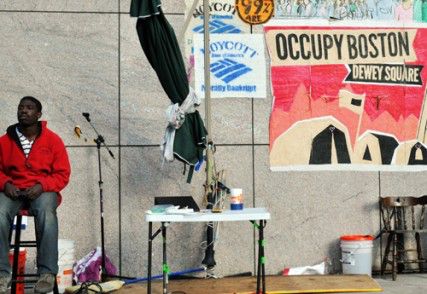
As Occupy Boston protesters celebrated two months of activism on Wednesday, Boston Mayor Thomas Menino moved one step closer to evicting demonstrators from their encampment.
On Wednesday, the mayor’s office filed an affidavit seeking the court’s consent to allow the city of Boston to evict Occupiers from Dewey Square at its own discretion, a spokeswoman from the mayor’s office who asked to remain anonymous said in a phone interview.
Occupy Boston filed a restraining order earlier this month that barred the city from evicting protesters from Dewey Square, but that injunction expires on Thursday, the spokeswoman said.
“[Menino] doesn’t have immediate plans to remove them at this point,” she said. “He remains sympathetic to their issues.”
In the court filing, the mayor’s office said the city believes in the protesters’ First Amendment rights to free speech and peaceful assembly, but public safety comes first.
“The city should have the right to make a quick decision if public health or public safety is put at risk,” the spokeswoman said. “Public safety is our number one concern, priority and responsibility. That includes the safety of the protesters and the public.”
Despite concerns about possible eviction, about 250 protesters marched on Wednesday to celebrate Occupy Boston’s two-month anniversary. They finished by singing ‘Happy Birthday’ to the encampment.
This kind of protest is allowed, the spokeswoman said.
The city said in the affidavit that the demonstrators “bear the burden of demonstrating that their sleeping in the Park is, under these facts, expressive conduct” protected by the First Amendment.
If they cannot prove that living in the park is a constitutionally accepted form of expression, the spokeswoman said, the city might be allowed to evict them.
The affidavit also outlined the city’s stance that by occupying Dewey Square, the protesters are preventing others from using the park. As a public park, Dewey Square should not be limited to “exclusive use” by Occupiers, according to the affidavit.
A representative of the Occupy movement in Boston, Matthew Shochat, said that living in the Square constitutes “expressive conduct.”
“I feel that our camp is a part of our image, and we lead by example, so losing our camp would be like losing our image,” he said.
Many demonstrators celebrating the two-month anniversary said they did not agree with the Boston Public Health Commission’s statement in the affidavit that the encampment fosters serious “health hazards.”
On-call medic Jessie, who asked to keep her last name anonymous, said that she was “very unhappy” about the city’s assessment that the camp poses safety and sanitation concerns.
“If Mayor Menino has an issue, I wish he would come and talk to the people,” Jessie said. “It’s not easy to maintain a safe camp, but people try very hard – we’ve had free flu shot clinics, given away free hand sanitizer around the entire camp, and much more.”
Occupy Boston has specific groups, such as a safety and sanitation group that would willingly address the city’s concerns, Jessie said.
The executive director of the BPHC, Barbara Ferrer, wrote in the affidavit, however, that during visits to the square she “made basic recommendations” such as “more efficient trash pick-up and removal.”
Ferrer also said she suggested “proper coordination of services and referrals from the medical tent and labeling of all medicines and liquids” and “protocols for sanitary kitchen and food use.”
“Many recommendations have not been consistently implemented,” she said in the affidavit.
The city also stated Occupy Boston has violated official fire codes and police instructions.
Despite the city’s accusations, the Occupiers said on Wednesday that the Occupy legal team has created a safety net for the movement, an automatic appeal of any decisions made in court that would prevent immediate eviction.
“We have a lot of legal and creative minds here and we have legal strategies set up,” said Ellen Fine, an Occupier from Needham.
Both Occupy Boston and the Menino administration have been participating in court mediation, Fine said, and the Occupiers do not believe they pose a threat to the city.
“We are a community,” Fine said, “modeling social and political change.”






















































































































